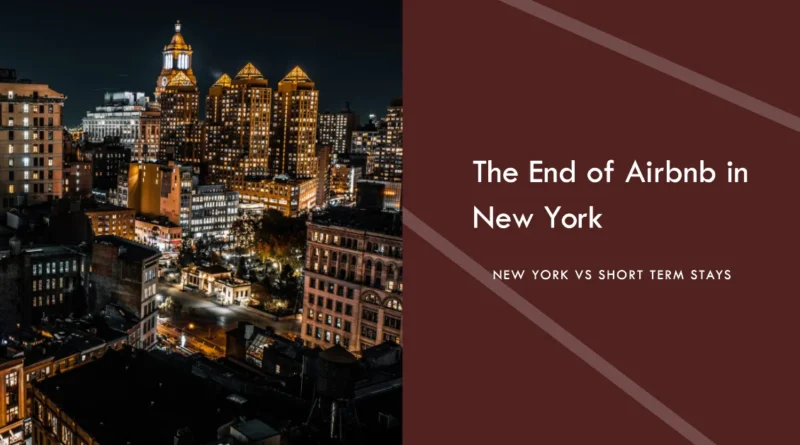Navigating New York’s Short-Term Rental Landscape: Airbnb and Regulatory Changes
New York’s Short-Term Rental Landscape: What’s in it for Airbnb
In the bustling metropolis of New York City, finding the perfect short-term rental has always been a unique experience. Whether you’re a traveler looking for a comfortable stay or a host seeking to accommodate guests, platforms like Airbnb have been a go-to option. However, recent regulatory changes have shaken up the short-term rental scene in the city that never sleeps. In this blog post, we’ll dive into the evolving relationship between Airbnb and short-term rentals in New York City and how it’s impacting both hosts and visitors.
Important Information
Here’s a summary of the key information regarding Airbnb and short-term rentals in New York City:
| Regulation | Description |
| 30-Day Rule | Rentals for fewer than 30 days require hosts to register with the city. |
| Host Presence Requirement | Hosts must be physically present during stays shorter than 30 days. |
| Airbnb Lawsuit | Airbnb’s lawsuit against NYC’s Local Law 18 was dismissed in August 2023. |
| Registration for Hosts | Hosts must register with the Mayor’s Office of Special Enforcement (OSE). |
These regulations aim to enhance safety, transparency, and accountability in the short-term rental market in New York City. While they have implications for both hosts and visitors, they represent the city’s commitment to regulating the industry more strictly.
The Airbnb Experience in NYC
Airbnb, the globally recognized online marketplace for lodging and travel experiences, has been a game-changer in the hospitality industry. It allowed New Yorkers to open their homes to tourists and earn some extra income while offering travelers a wide array of unique accommodations. From cozy apartments with skyline views to trendy lofts in Brooklyn, Airbnb transformed the way people experienced New York City.
Regulatory Changes in the Big Apple
However, the rise of Airbnb also raised concerns about issues such as housing affordability, safety, and the impact of short-term rentals on the housing market. To address these concerns, New York City introduced a series of regulatory changes aimed at ensuring that short-term rentals align with local laws and regulations.
The 30-Day Rule
One of the most significant changes is the introduction of the “30-day rule.” According to this rule, rentals for fewer than 30 days are only permitted if hosts register with the city. This registration requirement aims to bring transparency to the short-term rental market, allowing the city to keep a closer eye on listings.
Host Presence Requirement
Another key change is the requirement for hosts to be physically present during stays shorter than 30 days. This regulation ensures that hosts are actively engaged in the rental process, promoting safety and accountability.
Airbnb’s Response
Airbnb has been critical of these regulatory changes, referring to them as a “de facto ban” on short-term rentals. The platform argues that these rules place a heavy burden on hosts and negatively impact the city’s tourism economy. However, despite Airbnb’s objections, New York City has moved forward with its enforcement efforts.
The Dismissal of Airbnb’s Lawsuit
In August 2023, Airbnb’s legal battle against New York City’s Local Law 18 came to a conclusion when the lawsuit was dismissed. Airbnb had sued the city, claiming that enforcing Local Law 18 would make it more challenging for hosts to do business. The dismissal of the lawsuit solidified the city’s commitment to regulating short-term rentals more strictly.
Impact on Hosts
The enforcement of these regulations has significant implications for hosts in New York City. Hosting on platforms like Airbnb has been a source of income for many New Yorkers, especially those living in high-demand areas. The registration requirement and the need to be present during stays can make hosting more demanding and less flexible for hosts.
Impact on Visitors
For visitors, the changes mean that finding the perfect short-term rental in New York City has become a more challenging endeavor. While the regulations aim to enhance safety and transparency, they have also reduced the availability of short-term rentals.
Registration for Hosts
Hosts looking to navigate the new regulatory landscape must register with the Mayor’s Office of Special Enforcement (OSE). This registration process involves providing information about the property, agreeing to comply with regulations, and committing to being present during stays. While these requirements are designed to bring more accountability to the short-term rental market, they have undoubtedly added complexity for hosts.
What’s Next for Short-Term Rentals in NYC?
As New York City continues to enforce these regulatory changes, the short-term rental landscape is evolving. Hosts must adapt to the new rules, and visitors must navigate a more limited selection of rentals. It remains to be seen how these changes will impact the city’s tourism industry and the livelihood of hosts.
The Future of Short-Term Rentals
While the regulatory changes may pose challenges, they also have the potential to improve the short-term rental experience in New York City. With enhanced safety measures and a more regulated market, guests can have greater peace of mind when booking accommodations. Hosts who comply with the new rules can continue to provide a unique and comfortable stay for visitors.
Conclusion
The relationship between Airbnb and short-term rentals in New York City is undergoing a transformation due to recent regulatory changes. While these changes have created challenges for hosts and visitors alike, they also aim to enhance safety and accountability in the short-term rental market. As New York City continues to enforce these regulations, both hosts and guests will need to adapt to the evolving landscape. Whether you’re a host looking to register your property or a traveler searching for the perfect place to stay, understanding these changes is essential to navigating New York’s vibrant and ever-changing short-term rental scene.




